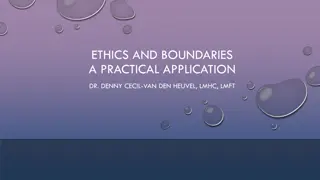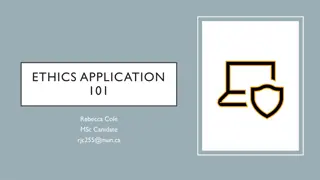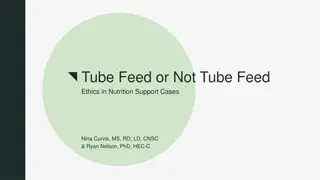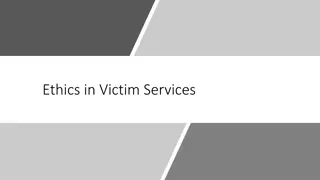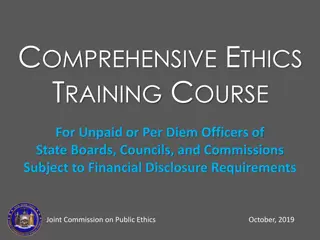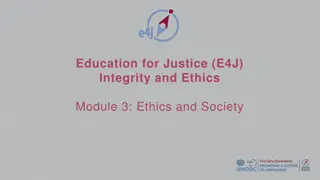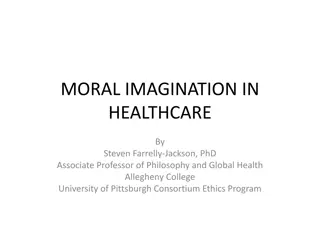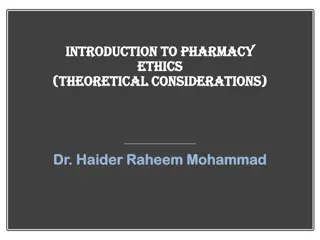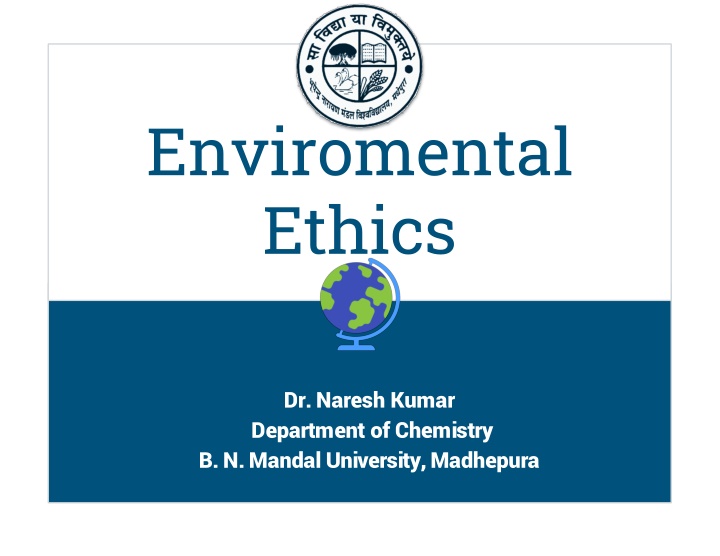
Environmental Ethics
Delve into the concept of Environmental Ethics, exploring the moral relationship between humans and the environment. Learn about the ethical principles, environmental damages, and the need for studying and implementing ethical values in conservation efforts.
Download Presentation

Please find below an Image/Link to download the presentation.
The content on the website is provided AS IS for your information and personal use only. It may not be sold, licensed, or shared on other websites without obtaining consent from the author. If you encounter any issues during the download, it is possible that the publisher has removed the file from their server.
You are allowed to download the files provided on this website for personal or commercial use, subject to the condition that they are used lawfully. All files are the property of their respective owners.
The content on the website is provided AS IS for your information and personal use only. It may not be sold, licensed, or shared on other websites without obtaining consent from the author.
E N D
Presentation Transcript
Enviromental Ethics Dr. Naresh Kumar Department of Chemistry B. N. Mandal University, Madhepura
What is Environmental Ethics? The moral relationship of human beings to and the value and moral status of the environment and its non human content. Study of the ethical basis of environment or discussion of the ethical basis of environmental protection.
Why we need to study Environmental Ethics? To overcome the following questions: 1. What are the environmental damages caused by the current generation? 2. What acts must be given to slow such damages?
Environmental Damage 1. Pollution: Air pollution Water pollution Land pollution/Soil pollution 2. Resource depletion: Depletion of Species & Habits Depletion of Fossil fuels, etc.
Environmental Ethics Principles We should have profound respect for nature/natural resources. We must maintain a harmonious relation with other natural species.Everyone should take responsibility for this bad impact on nature. Local & indigenous environmental knowledge should be respected by all human being. We must plan for the long term plan for non-human being.
The Ethical Values for Pollution Control We should recognized our moral duty to protect the welfare not only human beings, but also of other non-human beings of our system. Usefulness of non-human being for human being. Humans have no rights to reduce this richness & diversity to satisfy even their vital needs. The ideological changes is appreciating for life quality.
Ethical values to conserve damaged resources Proper utilisation of resources i.e. the people should maintain the ecological balance. We should adopt voluntary measures to conserve the resources by different awareness program. If we are to preserve enough scarce resources, so that future generation can maintain their quality of life at a satisfactory level.
Environmental Ethics
Definitions Moral Agents: Those who have the freedom and rational capacity to be responsible for choices Those capable of moral reflection and decision. Eg. adult humans of sound mind. Infants and mentally infirm adults are NOT moral agents.
Definitions Moral Standing: If you have moral standing: Your continued existence or welfare is valuable in itself (intrinsic value) Your interests and well- being must be weighed when deciding what is permissible to do. Eg. Humans of all kind Babies, children, adults, old people, women, different races, different cultures
Definitions Moral duties: - That which is owed by moral agents to those with moral standing. - Example: It is wrong to kill our children because we have a moral duty toward them
Philosophical Issue Who or what has moral standing, and why? - Does the environment have moral standing? - Must look at criteria for moral standing What moral duty do we (moral agents) have toward those with moral standing? - Different ethical positions suggest different moral duties.
Ideas on Criteria for Moral Standing The ability to feel pain - Therefore extend moral standing to animals
Ideas on Criteria for Moral Standing Being alive - Therefore extend moral standing to animals and plants: - All living things. Being part of nature - Therefore extend moral standing to the earth ecosystems. - Rocks, rivers, plants, animals, the entire natural world.
Various worldviews & Ethical perspectives - Philosophy - Anthropocentric - Stewardship - Biocentric - Ecocentric - Ecofeminism
Anthropocentrism We can best protect nature by looking out for human needs. - Eg. Ducks Unlimited preserves wetlands - Eg. Saving the rainforests will provide O and medicines for humans. Problem: Would you blow up the world if you were the last human?
Stewardship MAN AS STEWARD -A sense of responsibility to manage and care for the environment. Stewardship = Moral Responsibility Stewardship = Moral Responsibility Moral responsibility is nothing more than our capacity to be human and being able to take care of everything around us.
Stewardship Four Criteria of Moral Responsibility - The person has knowledge of the consequences of the act. - The person has the capacity to do the act. - The person has the choice to do it.
Man has moral responsibility towards nature We know that we can cause permanent damage to natural landscapes, resources and ecosystems We know that we can cause them. We know how we can prevent or remedy them.
Biocentric Life-centered morality All and only living beings, specifically individual organisms have intrinsic value and moral standing. Humans are not superior to other life forms nor privileged, and must respect the inherent worth of every organism Humans should minimize harm and interference with nature: eat vegetarian since less land needs to be cultivated.
Ecocentric Holism Ecosystem centered morality Non-individuals (the earth as an interconnected ecosystem, species, natural processes) have moral standing or intrinsic value and are deserving of respect. Individuals must be concerned about the whole community of life/nature. Humans should strive to preserve ecological balance and stability.
Eco-feminism Rejects Patriarchal Dualisms - The domination of nature by men is wrong is similar to and related to the domination of women by men. - Must break the pattern of "power over" relationships will benefit both women and the natural world.
Various worldviews & Ethical Perspectives
"The care of the Earth is our most ancient and most worthy, and after all our most pleasing responsibility. To cherish what remains of it and to foster its renewal is our only hope." - Wendell Berry Knowing all these exacts a moral obligation to act with care, foresight, forbearance and constraint.

